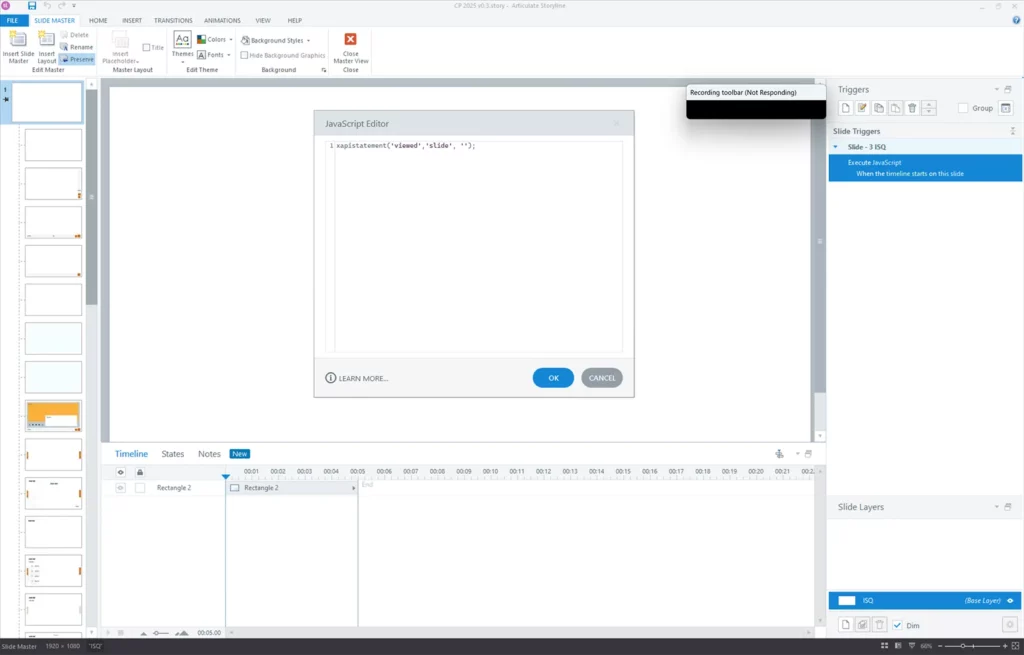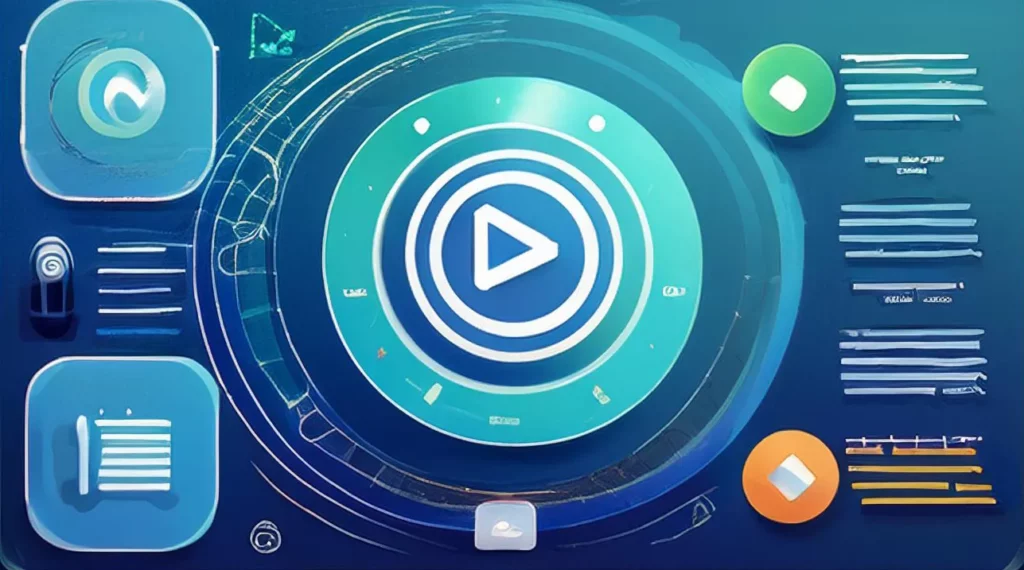Overview
This minicourse equips eLearning professionals with the knowledge and skills to effectively capture and utilise xAPI data from Articulate Storyline in a Learning Record Store (LRS).
By the end of the course, participants will understand how xAPI functions in tracking learner interactions, the process of integrating xAPI within Articulate Storyline, and how to leverage the data to improve and optimise training programs.

I’m interested in implementing xAPI with Storyline to capture valuable user data. Additionally, I’m exploring the use of AI to analyse the vast amounts of xAPI statements that could be generated.
This minicourse serves two key purposes. Firstly, it provides eLearning professionals with the tools to capture and utilise xAPI data effectively within Storyline. Secondly, through developing this course, I will deepen my own understanding of xAPI and its practical applications.
Given that many instructional designers and eLearning developers use Storyline to create online training, this course focuses on data capture from a familiar platform, helping participants apply this data to inform and enhance future training programs.

Target audience
This course is designed for a specific group of eLearning professionals. These individuals are typically instructional designers and eLearning developers who are looking to enhance their technical skills by integrating advanced data-tracking capabilities into their eLearning projects.
I anticipate that learners will be within a 25-55 age range and will have a few years of professional experience in the eLearning / instructional design field.
Many participants are likely to have a formal educational background and potentially have degrees in education fields. Also though, some may be self-taught professionals who have honed their skills through practical experience.
Learners will essentially be English-speaking professionals. Global or remote, geographic location is no barrier.

Background and Prior Knowledge
- Familiarity with Articulate Storyline: Participants will already have experience using Articulate Storyline, more than likely, as part of their job role. Ideally they would be proficient in designing interactions, developing assessments, and publishing courses using Storyline, but they looking to extend their expertise by integrating JavaScript and xAPI functionality.
- Awareness of xAPI and SCORM: Most participants will have basic knowledge of SCORM for tracking learning completion data, but may have only limited awareness of xAPI. They understand that xAPI offers more dynamic tracking possibilities and are looking to take full advantage of the potential opportunities.
- JavaScript Basics: These learners will have some familiarity with basic JavaScript concepts, and a desire to learn more about its practical applications in eLearning. Possibly, their JavaScript knowledge may be limited to minor tweaks or scripts within their courses.
- Learning Record Stores (LRS): Learners may have a basic awareness of LRS platforms but likely lack practical experience. They’re keen to understand how to transfer learner data to and from an LRS with xAPI.
Skills and Dispositions
- Technical Problem-Solving Skills: Participants are keen to find ways to improve learning design. They enjoy tackling new challenges, and are curious the potential of data analysis.
- Desire for Data-Driven Design: Learners know that by capturing and analysing user data, they can significantly improve learning outcomes, optimise course interactions, and provide stakeholders with meaningful insights.
- Attention to Detail: In this course, learners are focused on accuracy, particularly in coding and data tracking, and they grasp the significance of capturing and interpreting data precisely.
- Self-Directed and Resourceful: They prefer learning opportunities that offer flexibility, allowing them to progress at their own speed and put new skills into practice immediately.
Other Relevant Information
Freelance or Remote Workers
Many in this audience are freelancers or remote workers looking to expand their service offerings by incorporating more technical, data-driven components into their eLearning projects. Expertise in xAPI will give them a competitive edge, allowing them to stand out in a crowded market.
Corporate and Higher Education Contexts
Learners may also be working within corporate training departments or educational institutions, where xAPI data provides deeper insights into learner performance and course effectiveness. These professionals may be responsible for demonstrating the ROI of eLearning programs or optimising existing courses.
Interest in Cross-Platform Development
Some learners may work across multiple learning platforms and are keen to ensure that the data they collect can be utilised in different environments.
They are eager to apply their xAPI knowledge to a range of authoring tools and platforms beyond Storyline.
Participant Summary
By the end of the course, participants will not only learn how to capture xAPI data in Storyline but also how to leverage this data to deliver meaningful learning interventions.

Course Type
Technical Skill Development
This minicourse focuses on developing practical, technical skills for instructional designers and eLearning developers looking to extend their abilities in capturing and analysing xAPI data from Articulate Storyline. A skills-based course is the best approach to solving the identified learning gap because the subject matter is highly specialised, requiring hands-on application of coding within a familiar eLearning development environment. The course will equip learners with the specific expertise they need to integrate xAPI into their work and leverage it to enhance training programs.
Course Modality
Asynchronous Online
Given the technical nature of the content, a self-paced online modality is ideal for this minicourse. This format allows learners to progress through the material at their own speed, providing the flexibility to pause, review, and practice coding tasks without time constraints. It also suits the target audience of instructional designers and developers who may have varied schedules and prior knowledge of JavaScript and xAPI. The online modality ensures learners can engage with the content anytime, anywhere, and revisit sections as needed to build confidence in applying new skills.


Learning Objectives
By the end of this course, learners will be able to:
- Integrate xAPI statements into Storyline projects to track specific learner interactions.
- Write JavaScript code to send xAPI statements from Storyline quizzes to a Learning Record Store (LRS) and verify successful data transmission.
- Analyse xAPI data collected from Storyline interactions and use it to generate insights to enhance eLearning designs.
- Implement xAPI tracking in various Storyline projects and apply these methods to other eLearning authoring tools that support xAPI.
- Demonstrate the ability to capture and report on learner progress through custom xAPI statements in a simulated training environment using Storyline.
Learning Activities
By the end of this course, learners will be able to:
- Integrate xAPI statements into Storyline projects to track specific learner interactions.
- Write JavaScript code to send xAPI statements from Storyline quizzes to a Learning Record Store (LRS) and verify successful data transmission.
- Analyse xAPI data collected from Storyline interactions and use it to generate insights to enhance eLearning designs.
- Implement xAPI tracking in various Storyline projects and apply these methods to other eLearning authoring tools that support xAPI.
- Demonstrate the ability to capture and report on learner progress through custom xAPI statements in a simulated training environment using Storyline.
LDT100x
Learning Theory
LDT200x
Instructional Design Models
LDT300x
Digital Media Design
LDT400x
Capstone prroject
